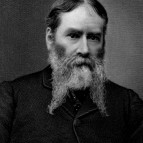
An American poet, critic, editor, and diplomat, James Russell Lowell (1819–1891) was one of the famous Fireside Poets along with Henry Wadsworth Longfellow, William Cullen Bryant, John Greenleaf Whittier, and Oliver Wendell Holmes Sr., who together were among the first American poets to become widely popular. Born in Cambridge, Massachusetts, Lowell spent a large portion of his life there, attending Harvard College, Harvard Law School, and then becoming a Harvard professor of languages for nearly two decades. Lowell’s literary career was extremely successful. His book, The Bigelow Papers, was called the most influential book of 1848 by the prestigious Grolier Club, the first bibliophile society in North America. He is known for his satire, informal use of the vernacular, and anti-slavery themes. A supporter of reform movements, his writings often discussed social issues such as temperance, labor, and capital punishment. In addition to his writings, he was the first editor of the Atlantic Monthly and coeditor of the North American Review. Besides writing, he was also appointed Minister to the Court of Spain by President Rutherford B. Hayes in 1877, and later Minister of England in 1880.
